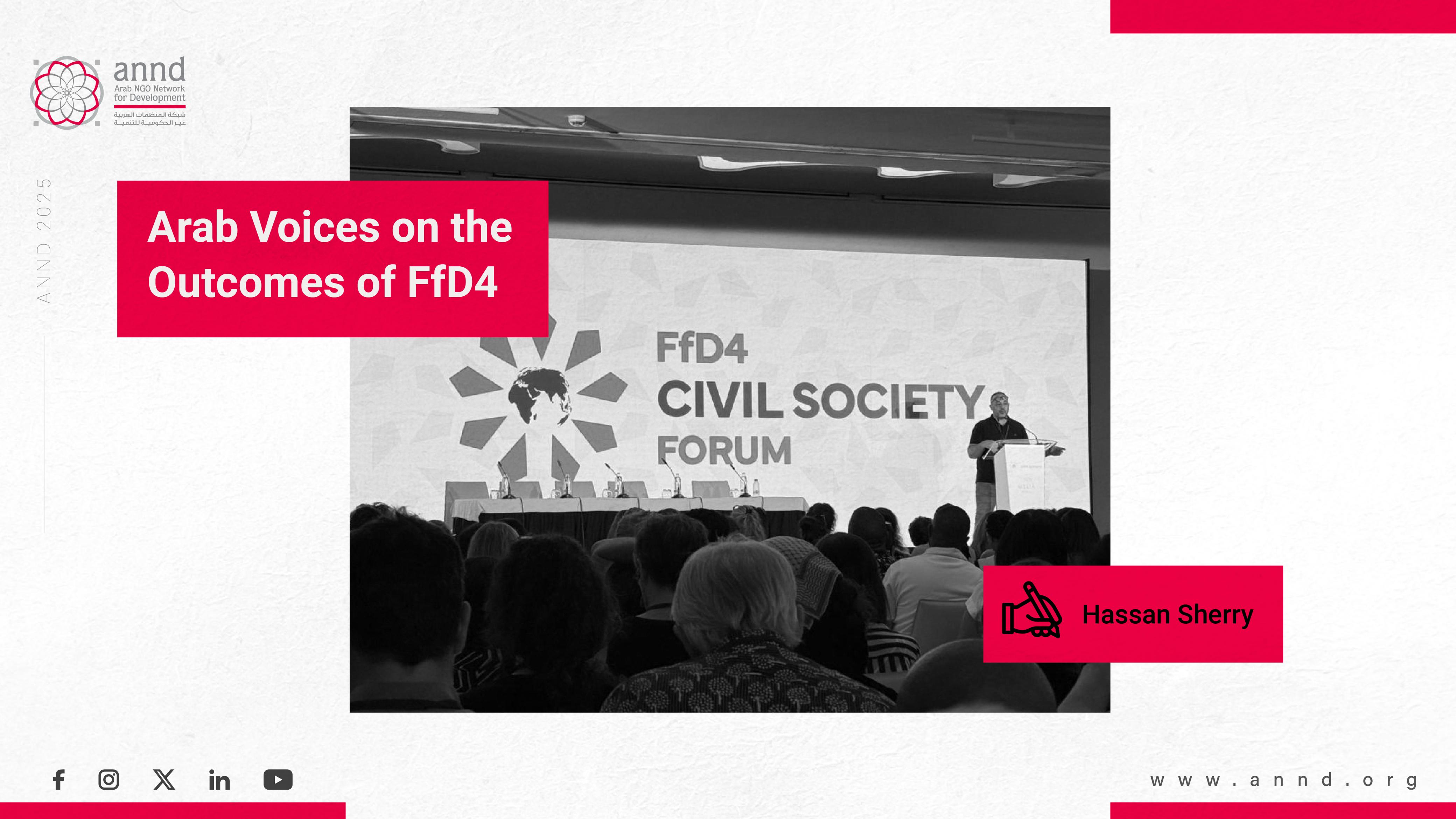Arab Voices on the Outcomes of FfD4 - Hassan Sherry
Civil society organizations concluded their participation in the Fourth International Conference on Financing for Development (FfD4), held in Seville between June 30th and July 3rd, 2025, affirming that the outcomes of the official conference, despite some partial positive steps, did not meet expectations. Whether in the discussions that took place during the conference or in the official final document "The Seville Commitment" (El Compromiso de Sevilla), the conference's conclusions did not respond to the magnitude of the escalating global challenges, including rising inequalities, unsustainable debt burdens in the Global South, continued tax evasion and illicit financial flows, worsening climate and environmental crises, and the failure to provide decent work, amid shrinking civic space, escalating militarization and increased associated spending, while development aid declines and wealthy countries abandon their commitments. This comes at a time when Sustainable Development Goals (SDGs) indicators show stagnation and regression towards achieving them.
The Arab region is not isolated from these challenges, but rather lies at their heart, as 14 countries have not yet achieved a single Sustainable Development Goal. Estimates indicate that the absence of progress would extend the deadline for achieving the Sustainable Development Goals in 2030 by an additional 60 years. Therefore, these issues are not only technical or economic, but touch on the essence of social justice and human rights, and the absence of the desired change in the global financial and economic system means that the countries of the region, such as many countries of the Global South, will continue to face financial, economic, and social pressures that impede fair and sustainable development.
Key Highlights of the Outcomes
A key feature of the FfD4 conference outcomes is the absence of substantial progress on the most critical structural issues. No concrete steps were taken towards establishing a fair and transparent international mechanism for addressing debt crises, despite the growing need for such a mechanism, particularly in the Global South countries and the Arab region, which remain subject to creditor-led mechanisms that undermine opportunities for equitable development. Furthermore, despite welcoming the General Assembly's decision to launch negotiations on an international convention on tax cooperation, the conference failed to provide the necessary political and financial support for this process, amid the withdrawal of several influential countries in the global financial system. The conference also made no progress on reforming governance within the International Monetary Fund and the World Bank to ensure a more equitable representation for developing countries, which maintains the balance of power in the global financial system as it is. Regarding the global trading system, the conference, under pressure from the Global North countries, failed to push for substantial reforms despite the urgent need for a fair framework led by developing countries. Key proposals, such as reforming the investor-state dispute settlement (ISDS) mechanism, preferential treatment, and controlling the critical minerals trade were ignored, without addressing the increasing unilateral trade measures that undermine the economic sovereignty and fiscal space in the Global South countries.
A Call from Civil Society in the Arab Region: Advocacy is Essential
The challenges facing the region and the Global South are inherently structural, reproduced through the inequitable design of the existing global financial and economic system. Overcoming these challenges is a political choice that requires a firm commitment from various stakeholders, particularly civil society, to the principles of justice, equality, democracy, and the public welfare of societies.
Although the Seville conference did not achieve the desired outcomes, it reinvigorated civil society's determination to push for radical reforms in the global financial and trade systems. In this context, civil society organizations in the Arab region call for strengthening and expanding regional mobilization and linking it to global movements to push for structural reforms in global economic governance, placing social justice and human rights at the heart of the development financing agenda. This includes supporting ongoing negotiations towards a UN convention on international tax cooperation to build a more just and inclusive global tax system, and demanding a binding UN agreement on debt that guarantees a multilateral mechanism for crisis resolution.
On the other hand, civil society organizations in the region highlight the importance of pushing for regulation of the private sector’s role, particularly multinational corporations, through binding agreements and effective accountability frameworks, and rejecting traditional economic solutions based solely on market logic. Accordingly, investor-state dispute settlement (ISDS) mechanisms, which hinder national policies, should be reconsidered, and privatization and profit-based development models should be rejected, in favor of strengthening public investment in basic services and social protection.
Finally, civil society, as stated in the "Declaration issued by the Civil Society Forum (FfD4)" in Seville, reiterates the importance of calling for a fifth Conference on Financing for Development (FfD5) in 2030, with the aim of continuing pressure towards a more progressive and inclusive financing system. Achieving this goal necessarily requires protecting the civic space from increasing restrictions and ensuring effective and organized participation of civil society in all decision-making mechanisms.



